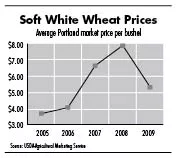Farmers eye better conditions, rising prices for wheat

Agricultural industry observers here see positive signs for the coming year, but add that carefully monitoring growing conditions and transportation issues will be paramount for farmers this year.
In 2009, prices for dried peas, lentils, and chickpeas remained strong, and growers in Eastern Washington and Idaho saw higher yields, says Tim McGreevy, executive director of the U.S.A. Dry Pea and Lentil Council, based in Moscow, Idaho.
Meanwhile, wheat prices remained flat, though slightly higher than last year, finishing the year at around $5 a bushel. This past year was a dry one for wheat farmers, and at about 124 million bushels, yields were off from average annual production of 135 million bushels, says Tom Mick, chief executive officer of the Washington Grain Alliance, based in Spokane. A sizable amount of rain last month, however, was a good sign for the coming year's winter wheat crop, offsetting dry September and October planting conditions and offering some protection to tender shoots that can be more vulnerable in the cold winter weather when the soil is dry, he says.
Jay Penick, president and CEO of Spokane ag lender Northwest Farm Credit Services, says that because lower yields in 2009 will be offset for many farmers by crop insurance they buy each year, the results of this year are about average.
"Overall, I think it's going to be considered an average year for the wheat producers. A lot of their income may come from crop insurance, though," says Jay Penick. "We had a lot of geographic areas that didn't have as good a crop."
Going into 2010, growers will be more dependent on getting better yields, since crop insurance is adjusted based on the prices from the previous year, and prices have fallen considerably from their 2007 highs of $15 a bushel, Penick says.
Another challenge both wheat and legume growers will face in the coming year is a three-month closure of barge traffic on the Columbia River, for repair or replacement of three locks on that river.
"We move 87 percent of Washington grain to market via the barge system," Mick says.
Penick says, "Any time you disrupt the normal flow from a marketing standpoint, whether it's transportation or storage—whatever it is, that always will have a negative impact, but if they've done a good job marketing in general, they'll get through that."
Mick says that wheat prices are starting to inch up, in part because of market investment in commodities index funds.
McGreevy says the coming year looks promising for pea, lentil, and chickpea growers alike.
"We've had strong sales, and our carryover stocks will be very low coming into the new crop year," he says. "We're having near record levels of pea and lentil production in the nation and still keeping our price levels strong. I hope next year I can say the same doggone thing."
Related Articles

_c.webp?t=1763626051)
_web.webp?t=1764835652)

